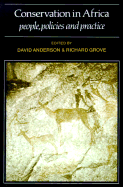Book contents
- Frontmatter
- Contents
- Preface
- List of contributors
- Introduction: The scramble for Eden: past, present and future in African conservation
- Part One Conservation ideologies in Africa
- Part Two Wildlife, Parks and Pastoralist
- Part Three Conservation priorities and rural communities
- Introduction
- 9 Local institutions, tenure and resource management in East Africa
- 10 Conflicting uses for forest resources in the Lower Tana River basin of Kenya
- 11 Environmental degradation, soil conservation and agricultural policies in Sierra Leone, 1895–1984
- 12 Managing the forest: the conservation history of Lembus, Kenya,1904–63
- Part Four Consequences for conservation and development
- Index
Introduction
Published online by Cambridge University Press: 04 April 2011
- Frontmatter
- Contents
- Preface
- List of contributors
- Introduction: The scramble for Eden: past, present and future in African conservation
- Part One Conservation ideologies in Africa
- Part Two Wildlife, Parks and Pastoralist
- Part Three Conservation priorities and rural communities
- Introduction
- 9 Local institutions, tenure and resource management in East Africa
- 10 Conflicting uses for forest resources in the Lower Tana River basin of Kenya
- 11 Environmental degradation, soil conservation and agricultural policies in Sierra Leone, 1895–1984
- 12 Managing the forest: the conservation history of Lembus, Kenya,1904–63
- Part Four Consequences for conservation and development
- Index
Summary
One of the most constant features of conservation in Africa over the last century has been the increasing externalisation of control over environmental resources. Up to the 1880s, management of ecological systems was still retained largely by rural communities, some of them using the mechanism of state power in order to achieve their objectives, others employing more informal means of control. With the establishment of colonial rule, however, the process began, at first sporadically and ineffectually and, from the 1940s, on a larger and more dynamic scale, by which the central government, drawing on a reservoir of metropolitan-based technical expertise, intervened in the shaping of African environments. For a brief period in the aftermath of independence the more irksome controls placed on African cultivators were frequently relaxed. But by the 1970s, growing concern at the mounting environmental crisis led to a renewal of state intervention, much of it inspired, financed and directed by agencies external to Africa. Attempts were made to reincorporate farmers and herders within the decision-making process but, as Little and Brokensha (Chapter 9) show, they were normally incomplete and left producers uncertain and concerned as to who was ultimately responsible for regulating the use of natural resources.
The four chapters contained in this Part move beyond a simple description of the process of externalisation to emphasise a variety of issues integral to that process. The first of these is the importance of indigenous African views of conservation and environmental management.
- Type
- Chapter
- Information
- Conservation in AfricaPeoples, Policies and Practice, pp. 189 - 192Publisher: Cambridge University PressPrint publication year: 1988



